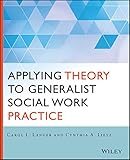Applying theory to generalist social work practice : a case study approach / Carol L. Langer, Cynthia A. Lietz.
Material type: TextPublisher: Hoboken, New Jersey : John Wiley & Sons, Inc., [2015]Copyright date: 2015Description: 1 online resource (337 pages) : color illustrationsContent type: text Media type: computer Carrier type: online resourceISBN: 9781118859711Subject(s): Social service -- Case studies | Social case work -- Case studies | Social service | Social case workGenre/Form: Electronic books.Additional physical formats: Print version:: Applying theory to generalist social work practice : a case study approach.DDC classification: 361.3/2 LOC classification: HV40 | .L284 2015Online resources: Click to View
TextPublisher: Hoboken, New Jersey : John Wiley & Sons, Inc., [2015]Copyright date: 2015Description: 1 online resource (337 pages) : color illustrationsContent type: text Media type: computer Carrier type: online resourceISBN: 9781118859711Subject(s): Social service -- Case studies | Social case work -- Case studies | Social service | Social case workGenre/Form: Electronic books.Additional physical formats: Print version:: Applying theory to generalist social work practice : a case study approach.DDC classification: 361.3/2 LOC classification: HV40 | .L284 2015Online resources: Click to View Includes bibliographical references and index.
Machine generated contents note: CHAPTER ONE: The Role of Theories in Social Work Practice Introduction What is Theory? The Relevance of Studying Theory for Aspiring Social Workers Case Example Evidence-Based Practice Further Debates Theoretical Integration Common Elements Implementation of Theory: The Role of Microskills Conclusion Resources for Students References CHAPTER TWO: Ecological and Systems Theories Introduction A Historical Discussion of Ecological and Systems Theories Ecological and Systems Theories: Theoretical Principles Ecological and Systems Theories: Key Concepts Application of Ecological and Systems Theories within Social Work Practice Case Example Stories from the Field Student Application of Skills Strengths and Limitations of Ecological and Systems Theories Conclusion Resources for Students References CHAPTER THREE: The Strengths Perspective Introduction A Social Work History Lesson Limitations of the Medical Model Moving Toward a Strengths Perspective The Strengths Perspective: Key Concepts The Strengths Perspective: Principles Application of the Strengths Perspective within Social Work Practice Case Example Stories from the Field Student Application of Skills Limitations of the Strengths Perspective Conclusion Resources for Students References CHAPTER FOUR: The Task-Centered Model Introduction Historical Development Theoretical Assumptions The Task-Centered Model and the Helping Process Applicability of Task-Centered Work Compatibility with Social Work Values and Ethics, Systems and Strengths Perspectives Case Example Stories from the Field Student Application of Skills Strengths and Limitations Conclusion Resources for Students References CHAPTER FIVE: Conflict Theory Introduction Historical Development of Conflict Theory Dialectical Materialism Macro Case Example Mezzo Case Example Application of Conflict Theory to Social Work Practice Stories from the Field Student Application of Skills Strengths and Limitations of Conflict Theory Conclusion Resources for Students References CHAPTER SIX: Humanism and Client-Centered Theory Introduction A Historical Discussion of Client-Centered Theory Client-Centered Theory: Theoretical Principles Client-Centered Theory: Key Concepts Stories from the Field Application of Client-Centered Theory within Social Work Practice Case Example Student Application of Skills Strengths and Limitations of Humanism Conclusion Resources for Students References CHAPTER SEVEN: Cognitive and Behavioral Theories Introduction A Historical Discussion of Behaviorism and Cognitive Theory Cognitive and Behavioral Theories: Key Concepts Cognitive Behavioral Therapy (CBT) Stories from the Field Application of Cognitive Behavioral Therapy within Social Work Practice Case Example Student Application of Skills Benefits and Limitations of the Cognitive and Behavioral Theories Conclusion Resources for Students References CHAPTER EIGHT: Empowerment Theory Introduction Basic Assumptions of the Empowerment Perspective Development of Empowerment in Social Work Historical Example Contemporary Examples of the Need for Empowerment Social Work with Groups and Empowerment Case Example Stories from the Field Student Application of Skills Strengths and Limitations of Empowerment Theory Conclusion Resources for Students References CHAPTER NINE: Narrative Theory Introduction A Historical Discussion of Narrative Theory Narrative Theory: Theoretical Assumptions Narrative Theory: Key Concepts Application of Narrative Theory within Social Work Practice Case Example Stories from the Field Stories from the Field Student Application of Skills Strengths and Limitations of Narrative Theory Conclusion Resources for Students References CHAPTER TEN: Solution-Focused Brief Therapy Introduction Theoretical Assumptions of SFBT Historical Development Use of the SFBT in the Helping Process Case Example Stories from the Field Student Application of Skills Strengths and Limitations of the Solution-Focused Model Conclusion Resources for Students References CHAPTER ELEVEN: Crisis Theory Introduction A Brief History of Crisis Theory Levels of Crisis Stages of Experiencing and Resolving a Crisis Case Example Critical Necessities of Each Stage The Critical Incident Stress Debriefing and Management Protocol Stories from the Field Student Application of Skills Strengths and Limitations of Crisis Theory Conclusion Resources for Students References CHAPTER TWELVE: Feminist and Critical Theories By Andrea N. Cimino, MSW, PhD Introduction Historical Foundation and Overview of Critical Theory Basic Principles of Critical Theory Foundation and Historical Overview of Feminist Theory Basic Principles of Feminist Theory Similarities and Differences Key Concepts Principles of Feminist/Critical Theory within Social Work Practice Case Example Stories from the Field Student Application of Skills Criticisms of Feminist and Critical Theory Approaches Conclusion Resources for Students References Chapter Thirteen: Transtheoretical Model Introduction Historical Foundation and Overview The Stages of Change Key Concepts Basic Principles Motivational Interviewing Application Case Example Stories from the Field Student Application of Skills Strengths and Limitations of TTM and Motivational Interviewing Conclusion Resources for Students References CHAPTER FOURTEEN: Theory and Practice: Pulling it all Together.
"The authors begin with an overview how theories are used in social work practice. The book then covers twelve evidence-based theories that are most commonly used by social workers with an undergraduate degree only: ecological & systems theory, stengths perspective, task-centered appraoch, conflict theory, humanistic & client centered, cognitive and behavioral theories, empowerment theory, constructivism, narrative theory, solution focused brief therapy, crisis theory, and critical and feminist theory"-- Provided by publisher.
Description based on print version record.
Electronic reproduction. Ann Arbor, MI : ProQuest, 2015. Available via World Wide Web. Access may be limited to ProQuest affiliated libraries.


There are no comments on this title.